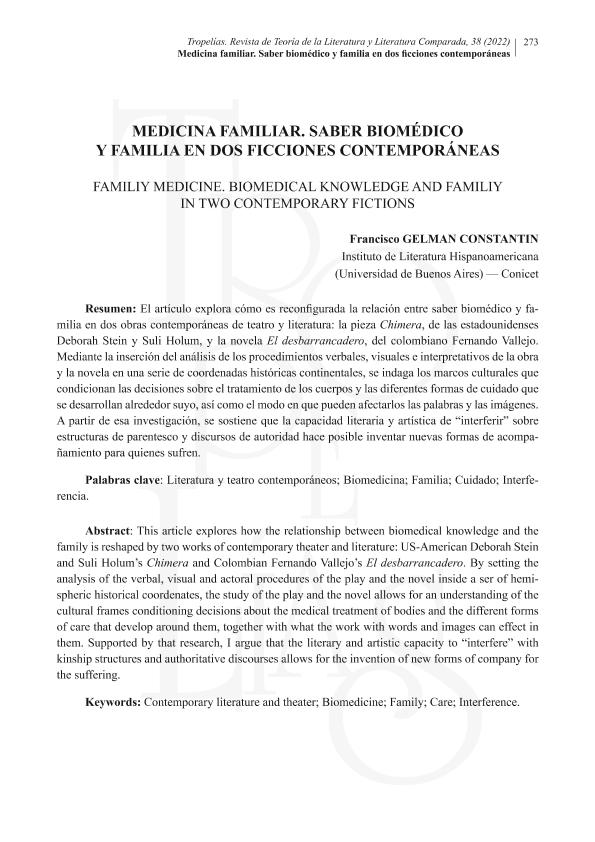Mostrar el registro sencillo del ítem
dc.contributor.author
Gelman Constantin, Francisco

dc.date.available
2023-06-23T15:37:29Z
dc.date.issued
2022-07
dc.identifier.citation
Gelman Constantin, Francisco; Medicina familiar. Saber biomédico y familia en dos ficciones contemporáneas; Universidad de Zaragoza; Tropelías; 38; 7-2022; 273-289
dc.identifier.issn
1132-2373
dc.identifier.uri
http://hdl.handle.net/11336/201307
dc.description.abstract
El artículo explora cómo es reconfigurada la relación entre saber biomédico y familia en dos obras contemporáneas de teatro y literatura: la pieza Chimera, de las estadounidenses Deborah Stein y Suli Holum, y la novela El desbarrancadero, del colombiano Fernando Vallejo. Mediante la inserción del análisis de los procedimientos verbales, visuales e interpretativos de la obra y la novela en una serie de coordenadas históricas continentales, se indaga los marcos culturales que condicionan las decisiones sobre el tratamiento de los cuerpos y las diferentes formas de cuidado que se desarrollan alrededor suyo, así como el modo en que pueden afectarlos las palabras y las imágenes. A partir de esa investigación, se sostiene que la capacidad literaria y artística de “interferir” sobre estructuras de parentesco y discursos de autoridad hace posible inventar nuevas formas de acompañamiento para quienes sufren.
dc.description.abstract
This article explores how the relationship between biomedical knowledge and the family is reshaped by two works of contemporary theater and literature: US-American Deborah Stein and Suli Holum’s Chimera and Colombian Fernando Vallejo’s El desbarrancadero. By setting the analysis of the verbal, visual and actoral procedures of the play and the novel inside a ser of hemispheric historical coordenates, the study of the play and the novel allows for an understanding of the cultural frames conditioning decisions about the medical treatment of bodies and the different forms of care that develop around them, together with what the work with words and images can effect in them. Supported by that research, I argue that the literary and artistic capacity to “interfere” with kinship structures and authoritative discourses allows for the invention of new forms of company for the suffering.
dc.format
application/pdf
dc.language.iso
spa
dc.publisher
Universidad de Zaragoza
dc.rights
info:eu-repo/semantics/openAccess
dc.rights.uri
https://creativecommons.org/licenses/by/2.5/ar/
dc.subject
LITERATURA Y TEATRO CONTEMPORÁNEOS
dc.subject
BIOMEDICINA
dc.subject
FAMILIA
dc.subject
CUIDADO
dc.subject
INTERFERENCIA
dc.subject.classification
Teoría Literaria

dc.subject.classification
Lengua y Literatura

dc.subject.classification
HUMANIDADES

dc.subject.classification
Ciencias Sociales Interdisciplinarias

dc.subject.classification
Otras Ciencias Sociales

dc.subject.classification
CIENCIAS SOCIALES

dc.title
Medicina familiar. Saber biomédico y familia en dos ficciones contemporáneas
dc.title
Familiy medicine. biomedical knowledge and familiy in two contemporary fictions
dc.type
info:eu-repo/semantics/article
dc.type
info:ar-repo/semantics/artículo
dc.type
info:eu-repo/semantics/publishedVersion
dc.date.updated
2023-06-22T13:35:11Z
dc.identifier.eissn
2255-5463
dc.journal.number
38
dc.journal.pagination
273-289
dc.journal.pais
España

dc.journal.ciudad
Zaragoza
dc.description.fil
Fil: Gelman Constantin, Francisco. Consejo Nacional de Investigaciones Científicas y Técnicas; Argentina. Universidad de Buenos Aires. Facultad de Filosofía y Letras. Instituto de Literatura Hispanoamericana; Argentina
dc.journal.title
Tropelías
dc.relation.alternativeid
info:eu-repo/semantics/altIdentifier/url/https://papiro.unizar.es/ojs/index.php/tropelias/article/view/6840
dc.relation.alternativeid
info:eu-repo/semantics/altIdentifier/doi/https://doi.org/10.26754/ojs_tropelias/tropelias.2022386840
Archivos asociados
